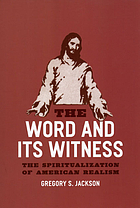
New theoretical approaches to race, gender, and empire have led a number of scholars to return to the role of religion (especially the Puritan legacy) in the culture of the United States. Gregory S. Jackson’s important The Word and Its Witness: The Spiritualization of American Realism investigates the significance of “homiletic narrative” in the shaping of American realist productions, both verbal and visual. Jackson argues that such homiletic narratives and the interpretive strategies that accompanied them, which insisted on a higher realism beyond pure empiricism, emerged from the United States’ Puritan legacy. Everything from the sermons of Jonathan Edwards to John Bunyan’s The Pilgrim’s Progress offered ways of thinking about the productive role of spiritual terror, possibilities for individual and national life plots, and social activism. Tracy Fessenden’s Culture and Redemption: Religion, the Secular, and American Literature, deeply skeptical about secularization narratives, argues that narratives of religious development and identity in both history and literature have privileged “Protestantism” as not only the default, but also the modern norm toward which all phenomena tend. Her study unravels how “Protestantism” and “religion” have come to be synonymous in American literature (frequently intersecting with shifting categories of race, gender, and empire).
 The Word and its witness: The Spiritualization of American realism by
The Word and its witness: The Spiritualization of American realism by